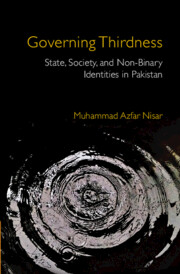Book contents
11 - Waste, Governance, and Inclusion
Published online by Cambridge University Press: 10 December 2021
Summary
When I started my fieldwork, I was interested in investigating the multiple forms of governance that intersect with the lives of the khawaja sira and how this intersection influences social equity by creating, sustaining, or contesting conditions of living at margins of the state and society. Various chapters of this book are explorations of this main theme. From the informal institutions identifying and disciplining the khawaja sira, to the insistence of law to fix their fluid identity, and the frontline workers limiting their presence in the public space, it is easy to identify a unifying theme operating through all these disparate forms of governance. In this concluding chapter, I explain this central governing leitmotif through the metaphor of waste.
There are multiple reasons for choosing this metaphor. As Jacobsen and Poder (2008, 51) note, ‘[w]aste is a conceptual tool of thinking sociologically with negations’. There are multiple sister concepts like the homo sacer (Agamben 1998; Catlaw 2007), abject citizenship (Kristeva 1982; Sharkey and Shields 2008), and inexistence (Badiou 2009; Prozorov 2014a, 2014b) that speak to some aspects of the khawaja sira's social situation. However, the metaphor of waste, which combines the idea of being discarded with the emotion of disgust, not only communicates best their social standing but also helps explain bureaucratic framing of the khawaja sira as moral pollutants in the public space.
In this regard, Douglas’ (1966) watershed work on waste is insightful. While many researchers have noted the problems associated with categorization schemas of society, it was Douglas who most clearly articulated that things that cannot be categorized easily given the governing social norms and categorization schemas, ‘matter out of place’, are often deemed disgusting, impure, and, hence, classified as waste. In other words, ‘the origin of waste stems from a social bifurcation between integrated and repressed individuals’ (Jacobsen and Poder 2008, 51). While Douglas’ work focused on all things (and people) classified as waste, it was Bauman (2004) who enunciated the concept of human waste most clearly. Bauman's concept of human waste (or wasted humans) aims to capture the experiences of the others, the deviants and the minorities who represent the failure of the classifying and order-building business of the state.
- Type
- Chapter
- Information
- Governing ThirdnessState, Society, and Non-Binary Identities in Pakistan, pp. 186 - 199Publisher: Cambridge University PressPrint publication year: 2022



